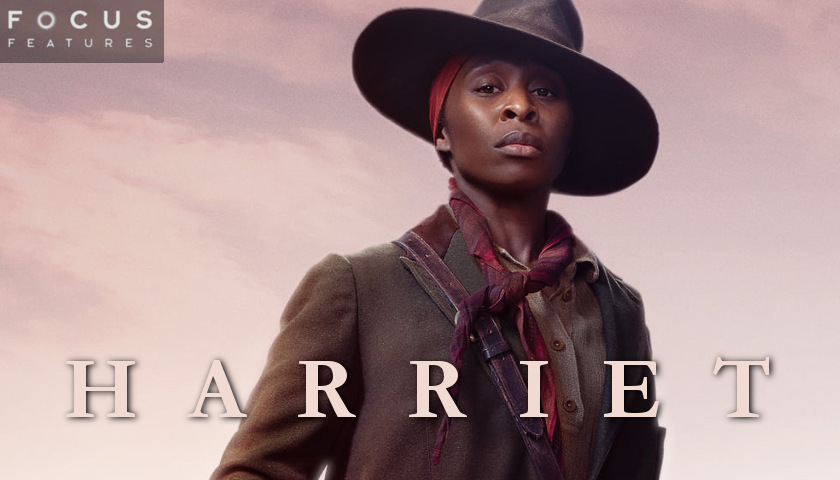There is near-universal agreement among movie critics that Cynthia Erivo, who plays the title role in Harriet, not only carries the movie, but makes it engaging, suspenseful, and rousing. Erivo is nothing short of spectacular, said Breitbart’s John Nolte, and we agree.
For many younger Americans who have had the misfortune to study American history under the strictures of Leftist revisionism, the story of Harriet Tubman will be obscure or unknown. And if it is known it will likely be known in terms of Tubman as the victim of oppression and America’s original sin of slavery.
What the movie Harriet makes clear, and what Cynthia Erivo’s Oscar-worthy performance brings to life, is that Harriet Tubman was no victim, and the two things that empowered her to transcend victimhood were her Christian faith and her gun.
Born into slavery on Maryland’s Eastern Shore in 1822, according to the National Park Service’s history for the Harriet Tubman National Historical Park and Harriet Tubman Underground Railroad National Historical Park, Tubman was originally named Araminta by her enslaved parents. She changed her name to Harriet upon her marriage to freeman John Tubman in 1844; she escaped five years later when her enslaver died and she was to be sold.
Escape-based movies are almost a subgenre of their own and they typically have an almost formulaic structure, Harriet Tubman’s initial flight northward establishes the movie’s Christian message primarily because it does not follow the formula of the typical prison break or flight from behind the Iron Curtain thriller.
There’s no buddy element, there’s no ingenious tunneling or McGivering of locks and prison doors – there’s just one woman alone, determined to overcome any obstacle to her freedom with only her Christian faith and the North Star to guide her.
And as the movie dialogue makes clear, what sustained Harriet Tubman wasn’t a Rocky Balboa-like obsession with accomplishing a goal, it was Tubman’s reliance on God that gave her her great strength and helped her break free from the hell of slavery.
After reaching Philadelphia and freedom Harriet Tubman vowed to return to Maryland to bring her family and friends to freedom; she spent the next ten years making as many as 19 trips into slave territory to rescue them. (Some sources say 13 trips, some say 19 trips South)
It is these trips that provide much of the edge-of-the-seat suspense, keep the film moving at a fast pace, provide much of the picture’s faith-based dialogue and provide for a respectful treatment of the relationship Harriet Tubman had with God.
The Christian Post’s reviewers, John Stonestreet and Maria Baer, wrote that:
Though Tubman prays audibly to God and expects God to answer, He doesn’t always do so in the way she wants or expects. After her own harrowing and unlikely escape early in the film, Tubman believes God wants her to rescue her husband. But she’s horrified when she returns to the South to discover he’s now married to another woman. She comes to believe instead that He sent her back for the sake of others.
Later in the film, Tubman is confused and desperate when her sister refuses to be rescued. She prays for relief, but it doesn’t always come. God speaks to her, sometimes with comfort and sometimes “like a slap.”
Stonestreet and Baer wrote that while some critics think this depiction of the Christian God looks too much like mysticism, they suggest the film portrays Tubman’s relationship with God in a way that is nuanced, complicated, and realistic – and we agree with that observation.
Something else Stonestreet and Baer wrote got our attention and we can’t quite decide if the filmmakers intended it or it was too central to the story to keep out – and that is how crucial guns are to the Harriet Tubman story.
Stonestreet and Baer wrote that some critics noted, with disdain, the movie’s lack of violence and they wondered, given that the movie was already pretty violent, how much more violence those critics wanted.
From our perspective, there was no gratuitous violence, however, it would be hard to find a serious movie where the heroine pulled a gun more often. Harriet isn’t a cartoon or part of a Vin Diesel action picture franchise; it is a serious look at history, and Harriet and her gun are in every poster, trailer and tease for the movie by necessity.
If the central message of the film is Harriet Tubman’s faith and reliance on God to inspire and sustain her fight for freedom, then the visual subtext of the movie is that very often the Lord’s chosen instrument to preserve her life and secure the freedom of her charges was one very large gun.
“I had reasoned this out in my mind; there was one of two things I had a right to, liberty, or death; if I could not have one, I would have the other; for no man should take me alive; I should fight for my liberty as long as my strength lasted…”
“I prayed to God to make me strong and able to fight, and that’s what I’ve always prayed for ever since.”
~ Harriet Tubman
– – –
Image “Harriet” by Harriet Film/Focus Features.




